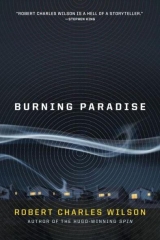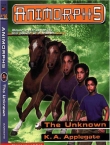
Текст книги "Burning Paradise"
Автор книги: Robert Charles Wilson
сообщить о нарушении
Текущая страница: 18 (всего у книги 20 страниц)
30
 THE ATACAMA
THE ATACAMA
CASSIE FOUGHT HIM, KICKING AT HIS LEGS and flailing at his face, trying to get enough traction to push herself out the door of the van. She managed to bloody his nose—bright red blood from the human shell of him pulsed down Leo’s upper lip—but he succeeded in pinning her to the seat, grunting through blood-stained teeth as he straddled her legs.
He was strong. He pulled shut the passenger-side door and locked it. With one hand he yanked open the glove compartment. Inside, there was a roll of duct tape and a hunting knife in a leather sheath. He used the tape to bind her wrists, then her ankles. Then he pulled the seat belt tight around her and taped the buckle so she couldn’t release it even if she managed to get her hands free.
She screamed and shouted at him as he did this. But it was late and they were deep in the high desert. A tank truck passed in the opposite direction as she struggled—she saw the word COPEC printed in fading orange letters on its side—but it didn’t stop or even slow down.
Once she was secure, Leo got behind the wheel and steered the van onto the road. Cassie stopped screaming and began quietly cursing him. He ignored her, and she tired quickly. Her throat was raw; her mouth was unbearably dry. She twisted her hands against the duct tape, though it felt as if she were peeling the skin off her wrists.
“Don’t,” Leo said. “You’ll hurt yourself.”
She tried to force herself to think. To imagine some way out of this. To get past the choking humiliation of it, a presence as intense as the reek of green matter. She guessed it was Leo’s father who had driven a needle through the lie of Leo’s body and into the stinking truth.
She should have known. This was her own fault. For years she had kept a careful distance from other people, so-called ordinary people, people who had never seen what she had seen, people so authentically innocent they couldn’t even dream such things. She knew what was hidden in the world’s shadows.
But in the end she had lowered her guard. She had given herself to Leo. And the thing she had allowed herself to love was a monstrosity: no, literally a monster. She suppressed the almost unbelievably urgent need to hurt him or run from him and forced herself to look at him: at Leo’s face, now utterly impassive as he watched the road ahead. If Aunt Ris’s theory was correct (and of course it was) this creature had constructed itself in a human womb (I’m not the first woman it violated), making the necessary adjustments so its human shell wouldn’t be some parthenogenic duplicate of its host, a chromosome here, a chromosome there… the end result: this ostensibly male object, the architecture and the furnishings of its skull, the high cheekbones and acne-scarred skin and gentle eyes concealing a filthy knot of green matter where there should have been a brain, every gesture and word and touch (it TOUCHED me, dear god, I LET IT TOUCH ME) dictated by signals from an invisible hive…
She managed to say, “I need to puke.”
“You need to listen to what I’m going to tell you.”
His voice sounded different now. Colder, flatter. Of course it did. He had dropped his mask. Or exchanged it for a different one. “I NEED TO PUKE!”
“Puke, then. Puke on the floor between your legs. Do it now, because if you keep making useless noise I’ll tape your mouth.”
She puked on the floor, not because he said so but because she couldn’t help it. It had been a long time since her last meal. All that came up was a sour brown dribble.
But it helped clear her thoughts. She felt as if she had floated a little way above her aching body.
“You know what I am,” the Leo-thing said. “You expect I’ll lie to you. But I’m not trying to convince you of anything. At this point it doesn’t matter what I want.”
Leo had been the hypercolony’s eyes and ears inside the Correspondence Society, privy even to Werner Beck’s secrets. He could have killed any of them or all of them, any time. Cassie wondered why he hadn’t.
“This van is packed with industrial explosives. Dynamite, the kind they use for blasting in mines. My father’s invention—”
“He’s not your father. You never had a father.”
“My father’s invention is a useless fantasy, but the dynamite is real. You need to know how to use it. Listen to me. I’m going to tell you what a blasting cap looks like, how to attach it to a stick of dynamite and how to fuse it. I don’t have time to tell you twice, so pay attention. You have to remember this.”
“You must be insane,” Cassie said.
But the creature went on talking.
Cassie was aware of the knife. It kept drawing her eye. It was a big knife, maybe ten inches long, in a leather sheath. The Leo-thing kept it wedged between his left leg and the driver’s seat, where she would have a hard time reaching it even if her hands were free.
The Leo-thing talked about how to crimp a blasting cap and how to ignite a fuse. She wondered what the point of all this could possibly be.
“But it’s not enough,” he said, “to ignite some explosives. To do real damage you have to know where to plant them. You have to think about other incendiary material in the environment, the fire that will follow and how it will burn.”
Did these assertions count as lies? Because the simulacra were liars: she had learned that from the Society; it had been implied on every page of her uncle’s book. But no, not liars exactly; they were simply indifferent to truth, had no conception of truth. She said, “What do you expect me to blow up?”
“If you weren’t smart you wouldn’t be here. I could have taken Beth. But you’re smarter and braver than Beth. Where do you think we’re going?”
Her hatred flared up fresh and hot. “Into the fucking desert!”
“Where exactly?”
“How should I know?”
“We’re going to the breeding facility.”
The place Eugene Dowd had described. She had not permitted herself that thought. It was too terrifying. She strained against the seat belt, tried to swing her bound and cramping hands toward the door latch.
“Stop. Calm down. Cassie, think. You know what your aunt said about there being two kinds of sims, two entities competing to control the hypercolony?”
Deep breaths. She closed her eyes. No point wasting her strength. What was left of it. She nodded.
“I want to destroy the facility. It doesn’t matter why. But I can’t do it alone. In fact I can’t do it at all. All I can do is give you a chance.”
She waited for him to go on. Lies, but maybe in his lies she could discover something she could use, some means of leveraging an escape.
“You know what I am,” the Leo-thing said. “I’m not just this body. I’m something larger. I’m older than you can imagine, Cassie. I’m weaker than I was, and I’m being eaten from the inside out. It’s past time for me to die. I want to die. I want you to help me die. Don’t you want that too?”
His voice sounded like the road under the wheels or the thin air skimming past the windows. It sounded like the white moon rising and the hollow basins of the salares. It sounded like the stars.
Where the highway met the railhead in a tangle of fenced yards and boxcars, Leo followed a two-lane road that veered away from San Pedro de Atacama and bisected the desert like a surveyor’s line. He had started talking about dynamite and blasting caps again. Cassie’s attention faded in and out. Words and fragments of words echoed in her head like frantic poetry.
She forced her eyes open and discovered that time had passed, though the sky was still dark. This endless night. Her hands were numb and tingling. Her body ached. Had she been having a nightmare? No. This was the nightmare.
She shook her head to clear it. The reek of sim blood had grown so intense that she no longer smelled it so much as felt it, a pressure in the air. The Leo-thing’s leg was dark with moisture.
The paved road gave way to gravel and ahead of them there was a huge moonlit mound, a wall of earth and debris that Cassie recognized with a kind of anesthetized dread as the breeding ground Eugene Dowd had described. Distant figures moved on the rim of it, black silhouettes against the blue-black sky. Some moved on two legs, some on four.
“Only a few minutes now,” the Leo-thing said.
He unsheathed the knife and leaned toward Cassie. She avoided his eyes and focused on the blade. It was bright and smooth and wickedly sharp. It moved in concert with Leo’s arm like the sting in a scorpion’s tail.
With his free hand he clasped her bound wrists. “Do you remember what I told you? Wake up, Cassie, wake up, this is important!”
She shook her head in incomprehension.
“I can’t hurt them,” Leo said. “There’s very little left of me. But I can shut them down. I can put them to sleep. And I’ll sleep too. Every living thing that operates under the protocols of the hypercolony will stop functioning. For a little while. Only a little while! You’ll be alone. So it’s up to you. You know what to do, right? Do it. And do it quickly.”
Was this the same Leo who had stroked her hair in a bed in a room on the long road down the spine of the Americas? The same Leo who had kissed her and told her to sleep well? Sleep well, Cassie.
He put the blade between her legs and sliced the duct tape binding her ankles. She watched the back of his head as he moved, his fine hair matted with sweat and road grime, the vulnerable nape of his neck. She thought about kicking him but couldn’t summon the strength.
On the distant berm, creatures both two-and four-legged began descending toward the motionless van. They moved with grace and deliberation and an eerie speed. When they passed into the moon-shadow of the hill they seemed to disappear altogether.
Leo drew back and looked at her. “I’m going to cut your hands loose. Hold still.”
She held still. He braced her arms with his body and slit the knot of tape in a single motion. Her hands began to burn as blood flowed back into them. She was still strapped into the seat.
Leo glanced down the road, where the sims were running toward the van, closing in on it, advancing into the glare of the headlights as if they were riding a wave of light. The six-limbed ones made her think of huge crabs, scissoring the air with their claws.
Leo turned the knife in his hand and grasped it by the blade. Cassie saw a line of blood well up from the web of skin between his thumb and index finger. He offered her the handle. She stared at it.
“Take it,” he said.
“What?”
“Take it! Take it, Cassie! Take it!”
She grabbed it from him, gripped the hilt with both hands and aimed the blade at him, her heart hammering in her chest.
“Now cut yourself loose from the seat belt.”
Without taking her eyes off him she felt for the fabric of the belt. She held it away from her hips and sawed at it. It parted, strand by strand, under the pressure of the blade.
“Remember what I told you,” the Leo-thing said.
As soon as he said it his mouth went slack. His head drooped toward his chest. He slumped against the driver’s-side door as she severed the last strands of the seat belt.
She scooted as far from him as she could get, angling the blade at Leo’s inert body. Was this a trick? His eyes were open but they didn’t move. He seemed to be staring with rapt attention at the ceiling of the van.
She spared a glance for the road. A few yards ahead of the van, the approaching sims had also fallen. They lay motionless in the harsh rake of the headlights.
She turned back to Leo. Was he breathing? She watched his chest. His stained blue work shirt moved in a slow but perceptible rhythm. He was unconscious but still alive.
It’s past time for me to die, he had said.
She opened the door so she could escape if she needed to. A gust of wind washed over her. She gulped cold air into her lungs.
She leaned into Leo’s unconscious body and stared into his unseeing eyes. Pupils like black pennies. Under the reek of sim blood she could smell the sharp human tang of his sweat. It was the way he had smelled when he hovered over her in bed, his arms braced and his back arched in a perfect tensioned curve. That earthy smell, like garden soil in sunlight.
She put the knife to his neck where it sloped from his Adam’s apple to the V-shape of his collarbone. She could see a faint pulse beating there. The point of the knife pricked his pale skin and one perfect red pearl of blood welled up.
Sleep well.
She put both hands on the handle of the knife and leaned forward.
She pushed Leo’s body out of the van and took his place in the driver’s seat. The puddle of blood on the vinyl upholstery stained her jeans and added its coppery stink to the redolent air. She put the vehicle in gear and drove slowly forward. She steered around the inert sims on the road. The human ones looked like people who had fainted or fallen asleep. The six-limbed ones—some with sharp claws at the end of their forearms, some with small, delicately-fingered hands—looked like sideshow monstrosities cobbled together from wax and animal fur.
At the top of the berm—she could see the installation below, the bunkers and smokestacks and the strange steel structure poised at the center of it like a gigantic flower—her courage nearly failed. Even with the explosives in the van, how could she possibly damage something so huge? Leo had told her how to fuse the dynamite and where to put it, but her memory was stuttering and imperfect and she distrusted everything he had said. She couldn’t go on.
All she had was momentum, and that was what carried the vehicle downhill into the sim town while she worked the brake sporadically. The grid of roads was linear and precise, every intersection burning with artificial light. Sims were everywhere, lying where they had fallen—not dead, she reminded herself, merely asleep, and not forever. They might wake at any moment. She drove over some of the bodies. They popped like rotten fruit.
She aimed the van at the metallic flower at the center of the facility. Under it, Leo had said, was an entire underground city: a city she could not imagine herself entering.
She was approaching an unmarked archway and a descending ramp when she saw something move in the sweep of her headlights. Cassie stood on the brakes. The suspension bottomed out and the rear of the vehicle skidded to starboard. She stared ahead. The distant motion became a comprehensible shape, a shadow puppet flailing its arms; it came still closer and turned into a human silhouette. A sim… but no. Not a sim.
She recognized him from the photo she stared at every time she read The Fisherman and the Spider. It was her uncle Ethan.
He didn’t seem surprised to see her and she was too dazed to be startled by his presence. She opened the passenger-side door and he climbed into the van. If the stink of blood and green matter offended him, he didn’t show it. She wanted to hug him but her clothes were sticky with blood. In her relief and astonishment Cassie began stammering out the story of the attack in Antofagasta.
She expected her uncle to interrupt her, to ask questions or offer an explanation of his own. He did neither, and the look on his face finally frightened her into silence. That owl-eyed emptiness: was it pity or dread or something worse? It occurred to her to wonder what had happened to him down in the undercity of the simulacra.
He seemed to be struggling to speak. “Cassie,” he said at last. “How did you get here?”
All she could say was, “Leo brought me.” She held up the palm of one bloody hand, as if that were an explanation.
“You know what this place is?”
“Yes!”
“What do you want to do here?”
“I want to burn it down! Isn’t that what you want?”
Strangely, he was a long time answering.
“Everything has a price,” he said.
“What are you talking about?”
“What we do here doesn’t end here. What we destroy here isn’t all we destroy.”
Was this even addressed to her? Her joy at finding him began to shrivel into something like dread. She took her left hand from the wheel and put it on the handle of the knife, still slick with Leo’s blood. Could she be sure her uncle Ethan was even a human being? “I have this truck full of dynamite and Leo said it was important to use it the right way—he told me the places I should put it but I don’t really remember—it’s hard to remember—and I don’t know if he was telling the truth—”
“I can show you the places. Where the fuel is, where they generate power, where they grow what they grow. We can burn it all. All of it that matters.”
“Will you really help me?”
He looked past the blood-spattered window of the van as if at something far away. “We’ll help each other.”
31
 ANTOFAGASTA
ANTOFAGASTA
NERISSA FORCED THOMAS UP THE STAIRS of the safe house. She held tight to him as he tried to pull away from her and join the fighting below, either to protect his sister or to prove he wasn’t afraid—endangering himself, in either case; but she was strong enough to clasp him in her arms and wrestle him to the second-story landing. She turned back just once, at the sound of a gunshot, in time to see Beth Vance tumble onto the risers with blood gushing from her open skull. She hoped Thomas hadn’t seen that, but maybe he had: he was suddenly more tractable as she pushed him into a bedroom and slammed the door behind her.
There was a bathroom attached the bedroom and she huddled there with Thomas, listening to the noise of the invasion. What ever heroic instinct had possessed Thomas, it abandoned him now. He crawled into the narrow space between the toilet and the tub and sat there, hugging his knees. Nerissa pressed her body against the door, sickly aware that their hiding place was no hiding place at all, that it was a cul-de-sac and would become a coffin if the sims succeeded in storming the house.
But the gunfire reached a crescendo and stopped. She looked at her watch. She tried to steady her breathing. She told Thomas to keep as quiet as he could, quiet as a mouse. She watched the minute hand circle the dial. Five minutes passed and there was nothing to hear but the creaking of beams and rafters as the afternoon heat subsided. Seven minutes. Ten. She detected the keening of distant police sirens.
She risked opening the bathroom door. Daylight was waning and the bedroom had filled with shadows. “Stay here,” she told Thomas, but he followed her into the hall.
There was no sound from downstairs. She took the enormous risk of calling out Cassie’s name. Had there been any answer—even the weakest response—she would have braved the gore-splattered stairs. But no answer came. If Cassie had survived she must already have fled. Fleeing was the only sane thing to do. The sound of the police sirens had grown noticeably louder.
The front of the house had been breached and the gunfire would surely have attracted a crowd in the street; it would be impossible to leave by the front door. A French door in the bedroom opened onto a tiny balcony overlooking the alley, and Nerissa put her head out to reconnoiter. It would be a long drop to the pavement… but if she climbed over the wrought-iron railing and dangled by her hands it might not be so bad. And then she could help Thomas down.
She explained the plan to Thomas. His face was as pale as parchment and he looked dazed, but he nodded as if he understood.
She made sure she had her wallet, which contained identification both real and fake and a stash of U.S. dollars and Chilean pesos. The alleyway was empty but probably wouldn’t be for long. She clambered over the railing and dangled from the ornamental iron pickets. When she dropped to the pavement she turned her ankle. Pain spiked from her calf to her hip, but she forced herself to stand. “Now you,” she called to Thomas.
He peered down from the balcony, his face a contortion of doubt and dread.
“I’ll catch you if you fall. You trust me?”
The boy nodded.
“All right, then. Come on—we have to hurry.”
He dropped into her arms; her ankle turned again; they sprawled on the grimy pavement but were safe.
“Take my hand,” she said, standing.
Thomas put his feverishly hot hand in hers. As she hobbled away, a busboy from the restaurant three doors south stepped into the alley and called after her: “¿Estás bien? ¿Necesita ayuda?”
“Estamos bien,” she shouted back, “gracias,” and turned a corner.
They boarded a city bus into Antofagasta’s business district and got out when Nerissa spotted a Holiday Inn that looked like it catered to Americans. Her scuffed hands and torn jeans drew sidelong looks from the lobby staff as she checked in, but cash on the countertop forestalled any awkward questions.
In their room she washed Thomas’s face—he looked at her impassively around the daubing of the washcloth—and encouraged him to lie down. He stretched out on the bed without complaint or comment.
She switched on the television, lowered the volume and pulled a chair close to the set. As much as she distrusted TV and radio, they were the only accessible source of news. The local TVN station opened its evening broadcast with an account of the attack, pitched as a multiple murder, possibly drug-related. Police were being cagey about the number of deaths, no doubt because of the problematic nature of the corpses the sims had left behind. There had been, the newscast said, “three confirmed deaths, two males and one female.” If the female was Beth Vance, the two males were probably Eugene Dowd and either Leo or Werner Beck.
Which meant Cassie had escaped. At least, that was a hope to which Nerissa could cling. Though even if it was true, she might never see Cassie again. Cassie might try to make her way back to the States, perhaps to the survivor circle in Buffalo, but possibly not. And it might be better if she didn’t.
She left the chair to feed Thomas and herself on what she could find in the bar fridge (chocolate, crackers, orange juice), to console him with soft words and finally to tuck him under the covers. Then back to the television, on the chance that it might yield new information. None was forthcoming. After midnight the newscast gave way to a dubbed Hollywood movie, decades old.
Nerissa’s thoughts began to fracture and veer strangely. She was exhausted, but this was more than fatigue, more even than despair: it felt like an expanding emptiness at the center of herself. She told herself she ought to go to bed, but standing up seemed like too much trouble. Instead she slouched more deeply into the chair and let her eyes drift shut. The sound of dubbed voices speaking hurried and awkward Spanish faded into noise. Silence is deep as Eternity; speech is as shallow as time. Who had said that? Samuel Johnson, she thought. Or no, Thomas Carlyle. She couldn’t remember.








